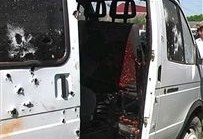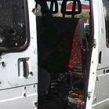
Murder of Ingush Judge Tied to Proceedings for 2004 Rebel Attack
Publication: Eurasia Daily Monitor Volume: 6 Issue: 118
By:

The high-profile assassination of Dagestan’s Interior Minister, police Lieutenant-General Adilgerei Magomedtagirov, on June 5 – responsibility for which was claimed personally by the commander of the Gimry Jamaat, Ibragim Gadzhidadaev (EDM, June 12) – has been followed by similarly gripping events in the North Caucasian enclave of Ingushetia.
On June 10, unidentified gunmen in Ingushetia’s capital Magas opened fire on the Gazel vehicle carrying deputy chairwoman of Ingushetia’s Supreme Court Aza Gazgireyeva, who was killed in the attack. Six other people, including passersby and a child were also wounded in the shootout (www.svobodanews.ru, June 10). This murder of a republican Supreme Court justice may have been an attempt to put pressure on the court in light of the tentative start of the proceedings in the case involving the June 21-22, 2004 raid on the Ingush capital of Nazran (later renamed Magas) by rebels under the command of Shamil Basayev, which resulted in the takeover of several strategic facilities and the killing of 56 servicemen from the ranks of the police, army and Federal Security Service (FSB).
Gazgireyeva’s assassination can hardly be a coincidence, considering that her predecessor, Khassan Yandiev, was murdered in Karabulak in April 2008 (www.gazeta.ru, April 18, 2008). Clearly, these attacks specifically targeted Ingushetia’s Supreme Court. Although Gazgireyeva was not one of the judges tentatively assigned to the case involving the June 2004 raid, the hit could have been designed to hurt the government’s prestige by drawing attention to its inability to protect even Supreme Court justices. The Russian Prosecutor General’s Office dispatched a team to the crime scene on the same day to assist with the investigation of Gazgireyeva’s murder and oversee the case (www.russianews.ru, June 11).
In another high-profile assassination, Bashir Aushev, a police colonel and member of President Yunus-Bek Yevkurov’s government who also served under former republican presidents Ruslan Aushev and Murat Zyazikov – in the posts of interior minister, deputy prime minister and Security Council secretary – was gunned down by an unknown attacker near his house in Nazran on June 13 (Interfax, June 13). Aushev sustained several wounds and died en route to the hospital.
This was not the first attempt on the life of Bashir Aushev, who did not have a good reputation in Ingushetia. According to civil opposition leader Maksharip Aushev (no relation), the slain colonel was one of those "responsible for unleashing the civil war in the republic." Maksharip Aushev added: "Bashir knew about the crimes committed by President Zyazikov’s associates and the death squads operating in Ingushetia. One should not discount the possibility that murder was committed by either of these groups to keep their crimes quiet. The second possibility is revenge by the families of those who were abducted or killed" (www.ingushetia.org, June 14).
Although Maksharip Aushev did not mention the third possible explanation – that is, that Bashir Aushev was assassinated by the insurgents – everyone understands that although this scenario is the most likely one, talking about it is not advisable for fear of potential pressure by the Russian Federal Security Service (FSB), as well as for security reasons. The victim had been a target of multiple prior bombings, arson attacks, shooting attacks and other incidents, so his eventual murder was easy to predict. The investigation into his assassination is also being overseen by the Investigative Committee of the Russian Prosecutor General’s Office.
The timing of these murders is especially embarrassing for the Ingush President Yunus-Bek Yevkurov, as they occurred just as his government was briefing the federal center in Moscow about the successful implementation of a counter-insurgency operation mounted by Ingushetia’s police, FSB and army troops in collaboration with Ramzan Kadyrov’s forces in Chechnya along the border between the two republics, in Ingushetia’s Sunzha and Chechnya’s Achkhoi-Martan districts. The hopes that the leader of the armed resistance movement in the North Caucasus, Dokka Umarov, might have been among the rebels killed in the operation proved to be baseless. The operation, conceived as a manhunt specifically targeting Umarov and launched on May 16 with the personal involvement of both presidents Kadyrov and Yevkurov, was designed to be a kind of final stroke in the propaganda campaign claiming that the resistance has been extinguished and that the word "rebels" should be mentioned no more. Instead, the underground fighters were now supposed to be referred to simply as bandits, just as they were during the Soviet period.
Changes in terminology have always been important in Russia for propaganda purposes, and in this case it was assumed that a final victory over the insurgency would be announced. It is well understood in Moscow, as well as in the region, that insurgent attacks will not cease, but the federal center today has to declare that the resistance has been squashed in order to continue to claim that the North Caucasus is "the most peaceful part of Russia," considering its proximity to the future Olympics site of Sochi.
In the meantime, Ingushetia’s government has again declared a "counter-terror operation" regime in the villages of Alkun, Dattykh and Arshty in the Sunzha district adjacent to the Chechen border. News reports out of Ingushetia more and more often refer to insurgents from Azerbaijan, which seems quite unlikely; the involvement of Dagestani fighters would have been a much more credible claim. In a nationally televised address directed at the rebels’ families, Ingush President Yunus-Bek Yevkurov told their parents to "go into the woods, go to the mountains and call out to your children to come home; I promise them their lives and normal conditions in jails" (www.ingushetia.org, June 13). This plea, though, is unlikely to sway those whose motives for joining the insurgency were fueled by their views on the current situation and not by a desire for revenge.
Conditions in Ingushetia remain tense as they have been for the last few years. Independent sources have reported that during the first three months of 2009, as many as 12 people were killed and 32 wounded in 38 armed assaults on army and law enforcement personnel (www.kavkaz-uzel.ru, June 12).
It is therefore easy to predict that more news reports of insurgent strikes against Russian troops in the region will follow.




